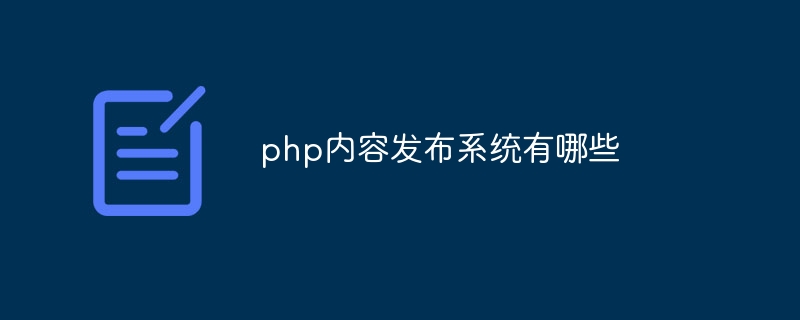
php content publishing systems include WordPress, Joomla, Drupal, TYPO3, etc. Detailed introduction: 1. WordPress. WordPress has a simple and easy-to-use interface and a rich plug-in ecosystem, allowing users to easily create and manage content. It supports multi-users and multi-sites, and provides a wealth of themes and plug-ins to satisfy different users. 2. Joomla, Joomla provides rich functions and flexible scalability, and can be used to build various types of websites, etc.

The operating system for this tutorial: Windows 10 system, PHP8.1.3 version, Dell G3 computer.
With the rapid development of the Internet, more and more websites and applications require a powerful content publishing system to manage and display content. As a popular server-side scripting language, PHP has many excellent content publishing systems to choose from. This article will introduce several commonly used PHP content publishing systems, including WordPress, Joomla, Drupal and TYPO3, and analyze their characteristics and uses.
1. WordPress:
WordPress is one of the most popular PHP content publishing systems. It is an open source blogging platform that can also be used to build various types of websites. WordPress has an easy-to-use interface and a rich plugin ecosystem, making it easy for users to create and manage content. It supports multi-user and multi-site, and provides a wealth of themes and plug-ins to meet the needs of different users. WordPress also has good SEO optimization capabilities, making it easier for the website to be included and ranked by search engines.
2. Joomla:
Joomla is another popular PHP content publishing system. It is a powerful open source CMS (content management system). Joomla provides rich functions and flexible scalability, and can be used to build various types of websites, including corporate websites, social networks, e-commerce websites, etc. Joomla has a friendly user interface and powerful permission management functions, making multi-person collaboration easier. It also provides a large number of templates and extensions to meet the needs of different users.
3. Drupal:
Drupal is a powerful PHP content management system suitable for building complex websites and applications. It offers a wide range of modules and themes to suit various needs. Drupal has a flexible data model and powerful permission management functions that can meet complex business needs. It also has good scalability and security and is suitable for large websites and enterprise-level applications.
4. TYPO3:
TYPO3 is a powerful PHP content management system suitable for building large and complex websites. It provides rich functions and flexible scalability to meet various needs. TYPO3 has powerful rights management functions and multi-language support, and is suitable for multi-person collaboration and international websites. It also has good scalability and security, making it suitable for large enterprises and organizations.
Summary:
The PHP content publishing system is an important tool for building websites and applications, and there are many excellent options. This article introduces several commonly used PHP content publishing systems, including WordPress, Joomla, Drupal and TYPO3. Each of them has different characteristics and uses, and users can choose the appropriate system according to their needs. Whether it is a personal blog or a corporate website, these systems can help users easily create and manage content, improving user experience and website usability.
The above is the detailed content of What are the PHP content publishing systems?. For more information, please follow other related articles on the PHP Chinese website!